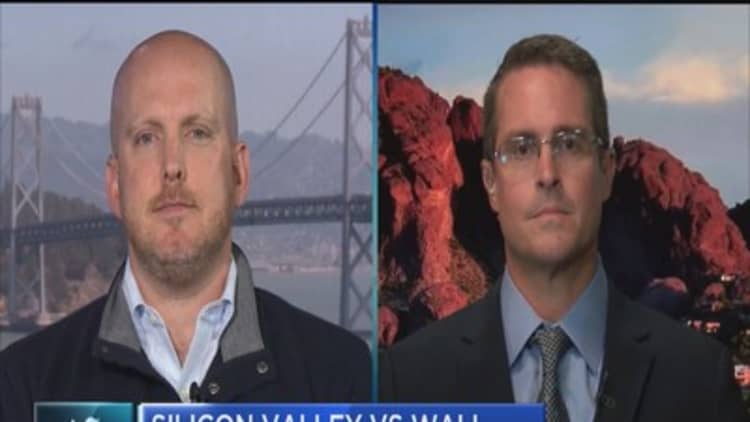
The stock market is in its seventh year of a bull market. Yet while business is booming on Wall Street, so is stress among its workers—particularly first-year analysts. Recent reports of suicides have made headlines, shining a spotlight on the industry's long and hard work hours.
Meanwhile, across the country, the tech industry in Silicon Valley is also booming. Yet, reports of stressed-out employees aren't nearly as commonplace.
Sam Wholley, a partner at San Francisco-based recruiting firm Riviera Partners, said it comes down to the fact that Wall Street and Silicon Valley are two different cultures—and if the financial industry wants to continue to attract top talent from across the country, it will have to change its ways.
Read More
"The culture on Wall Street is really about individual performance, so [everyone] is out for themselves," he said in a recent interview with CNBC's "Closing Bell."
In fact, Riviera now employs people who used to work in Wall Street's high-pressure environment, he added.
"In the Valley, it's a lot more about the safety net that's there for everyone who's out there to produce, to innovate, to do something new," said Wholley, adding, "If something happens, you've got...a support system from all over the world who are here all trying to strive for the same thing."
Survival of the fittest?
However, when it comes to measuring work-life balance across industries, both finance and information technology rate just slightly above average, according to jobs and career website Glassdoor. The financial industry has a rating of 3.0 on a scale of 1.0 (very dissatisfied) to 5.0 (very satisfied)—down from 3.5 in 2009. Information technology scored a 3.2, also down from 3.5 in 2009.
And those who work in financial services are 1.5 times more likely to commit suicide than the national average, according to the National Occupational Mortality Surveillance. But recent unexpected deaths or suicides of young financial workers over the last year have caused some firms to re-evaluate work policies.
Read MoreBarclays analyst to interns: 'Welcome to the Jungle'
Wholley and his firm have worked with some Wall Street firms, and said some are adopting more of a West Coast culture. That's important if they want to convince potential employees to pick up and move across the country for a job, he said.
But Chad Dean, managing partner at Integrated Management Resources, disagrees. He doesn't believe Wall Street's culture is more taxing and points out that workers in both industries work long hours.
Plus, Wall Street employees know what they're signing up for or they wouldn't be chasing the prestige and money that comes along with it, said Dean, who specializes in recruiting for the financial markets.
"People understand that they're going to have to work hard hours," he said. "They understand that they are going to have to commit a significant part of their young lives to Wall Street and to the firm that they're working for."
Read More An American workplace war that's reached a tipping point
Dean called it survival of the fittest, but he said the hard work pays off.
"Once you come out of a good school and you work for a prestigious firm for a couple of years, the doors open up on the private equity side, they open up with the buy side with hedge funds," Dean noted.
—CNBC's Crystal Lau and Andrew Ross Sorkin contributed to this report.



